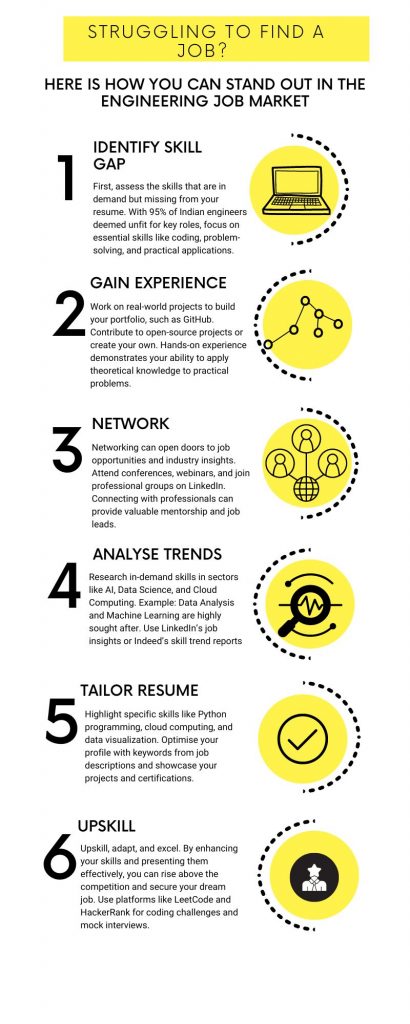How is India’s engineering crisis, with rising unemployment and declining education quality, impacting global IT service delivery?
On July 11, a crowd of 1,800 job seekers converged at the Lords Plaza Hotel in Gujarat, India, in hopes of securing one of only ten job openings at an engineering company located in the Gujarat Industrial Development Corporation complex in Jhagadia.
Rituja Bakshi was one of the people in que that day. “It was an unbelievable scene,” she said. “I’ve never seen anything like it. We’d heard about the job openings, ten positions, but when we got there, it was like a stampede. People were pushing and shoving, desperate to get inside. The pressure was immense.” As the hours passed, the crowd swelled, with anticipation turning into anxiety and desperation.
The situation quickly turned chaotic as the overwhelming number of attendees pushed and jostled to gain entry, resulting in a steel railing giving way and several people falling, with 2 persons ending up with fractures. “Everyone was just stunned. You could see the desperation in people’s eyes. For ten jobs, this was the scene? It’s heartbreaking, really,” said Rituja. Sadly this is the reality for many engineering students in the country. This scene is illustrative of what is happening across India, with applicants for engineering jobs vastly outstripping the number of openings.
“Engineering is not what it used be. While it was once considered a guaranteed path to a stable job, the market and scope itself has changed significantly” says Dr. Anirudhha Sinha, an education policy expert at Delhi University. “The rise of automation and rapid technological advancements has changed the demand for engineering skills”.

Image credits: Freepik
According to the All India Council for Technical Education (AICTE), the number of engineering colleges in India increased from around 1,500 in 2000 to over 3,300 in 2020. This rapid expansion has led to a surge in engineering graduates. The country produces 1.5 million engineering graduates annually, a figure that dwarfs the job market’s capacity. Only a meagre 3% secure coveted positions in high-tech firms. The remaining majority faces a bleak reality: unemployment, underemployment, or a career pivot far removed from their engineering degrees.
“It’s a complete mismatch,” Dr Sinha says “We’re producing engineers at a rate that’s unsustainable. The quality of education is compromised, and the industry is not prepared to absorb this massive amount of graduates.” She explains that many engineering graduates lack essential practical skills like coding, problem-solving, and communication. As a result, companies are forced to invest significant resources in training new hires. “The outdated curriculum in many engineering colleges fails to provide students with the knowledge and skills required by the modern workforce,” she says.
The repercussions of this crisis extend far beyond India’s borders. For years, the UK and US tech industries have relied heavily on Indian engineers to fill their workforce. Companies are investing heavily in training new hires to compensate for the skills gap. “We’re spending up to £ 1,500 on training programs,” says Jyothi Mahalingam, an IT recruiter based in London. “It’s a frustrating waste of resources. Projects are taking longer to complete, and the quality is also affected,” says Jyothi. “It’s a real challenge for businesses trying to stay competitive.”
As India grapples with its engineering crisis, the global tech industry is forced to adapt. While the country once represented a goldmine of talent, the focus is now shifting towards other regions. “Indian engineers have been the backbone of our IT departments,” says Sarah Kneubuhler, a tech recruitment manager at a London-based firm Wisteria Solutions. “Their cost-effectiveness and technical skills were a huge draw.” However, the tide is turning. The declining quality of Indian engineering graduates is forcing companies to look elsewhere. “We’re seeing a significant shift towards Eastern European countries like Poland,” she says. “Despite language barriers, Polish engineers demonstrate a stronger problem-solving approach and a better grasp of practical applications. The time zone advantage also favours Poland. Collaborating with teams in the US and UK is much smoother with Polish engineers,” says Sarah.

Image credits: Freepik
A recent survey by leading industry body NASSCOM revealed a shocking statistic: 95% of Indian engineers are deemed unfit for programming or coding jobs, the backbone of the tech industry. This exposes a glaring gap between academic curriculum and industry requirements. This alarming figure underscores the critical skills mismatch plaguing India’s engineering graduates. While the country produces a vast number of engineers annually, a significant portion lacks the fundamental programming and coding abilities essential for today’s tech-driven economy. The root of the problem lies in India’s education system, which has been accused of prioritising quantity over quality.
“Engineering colleges have mushroomed across the country, driven by profit motives rather than academic excellence,” says Professor Rajeev Kumar, former head of the Department of Engineering at IIT Kanpur. “The focus is on churning out graduates, not creating engineers capable of solving real-world problems.” This overemphasis on quantity has led to a decline in the overall quality of engineering education. “Many colleges do not even have the necessary infrastructure, lab equipment and qualified faculty. As a result, graduates often find themselves ill-prepared for the challenges of the professional world”. Additionally, the rapid expansion of engineering colleges has diluted the prestige of engineering degrees, making it difficult for employers to distinguish between top talent and average graduates.
“We’re hiring engineers with good grades, but they lack problem-solving skills and practical knowledge,” says Jyothi. Many companies report similar experiences, where new hires require extensive training to become productive members of the workforce, increasing recruitment and onboarding costs. This skills gap is particularly pronounced in sectors that demand high levels of innovation and problem-solving, such as software development, artificial intelligence, and robotics. “The inability of engineering graduates to apply their knowledge to real-world challenges can hinder the workflow. A strong engineering talent pool is crucial for driving innovation and economic growth, but the current skills mismatch is a major obstacle”, says Jyothi.
The COVID-19 pandemic worsened the crisis for engineering graduates in India. Mass layoffs in the tech sector, a primary employer of engineering talent, left countless professionals jobless. A study by NASSCOM revealed that the IT industry alone witnessed a job loss of approximately 150,000 between March 2020 and March 2021. This, coupled with a global economic downturn that saw unemployment rates soar, particularly in sectors reliant on technology, created a perfect storm for engineering graduates.
Even those who managed to retain their jobs faced significant challenges. Salary cuts became commonplace, and workloads increased as companies sought to cut costs and maintain operations. “The pandemic was a wake-up call,” says Priya Sharma, a software engineer who lost her job during the first wave. “The competition for jobs is fierce. You need more than just a degree to survive. You need to constantly upgrade your skills to stay relevant.”

Image credits: Freepik
To make matters worse, some companies have resorted to dubious hiring practices. Bulk hiring without adequate job roles has become commonplace, with companies often recruiting far more graduates than available positions. This phenomenon, often driven by short-term goals and the pressure to inflate headcount numbers, has severe consequences for both employers and employees.
“I was part of a batch of 100 freshers hired by TATA Consultancy Services,” says Ankit Desai, an engineer from Mumbai. “We were promised exciting projects and career growth. But the reality was far different. Most of us ended up doing admin tasks, with little opportunity for advancement.” Such practices create a false sense of security among graduates, trapping them in dead-end jobs and delaying their career progression. This not only impacts individual careers but also contributes to a larger issue of underutilization of skilled talent. Moreover, it can lead to a decline in employee morale, increased attrition rates, and a damaged employer brand.
Companies that engage in bulk hiring often fail to provide adequate training, mentorship, or career development opportunities for new recruits. “Without proper support or guidance, we are actively stopping young professionals and graduates reaching their full potential. Again, the overall quality of work suffers, as employees are often overworked and have no scope for improvement” says Professor Rajeev. “To address this issue, companies must go for a more practical approach to hiring, focusing on quality over quantity. They should first asses their needs and then decide on workforce capacity and recruitment. Otherwise, it will end up ruining the lives of these engineer graduates” he says.
The job market for engineers like me has been dire, especially after the pandemic
Priya Sharma, Software Engineer
One glaring example of this issue is the premature hiring practices of some companies. For instance, in 2022, NatWest recruited 40 fresh graduates from Stella Maris College in Chennai. However, over a year later, these students have yet to be onboarded. Ana*, one of the affected graduates, expresses her frustration: “How is it fair for them to recruit us without having openings? We were discouraged from applying to other companies because we were selected by NatWest, but that opportunity has gone to waste.” The lack of available positions has left these graduates in limbo, unable to find other work or continue their studies, leading to an unplanned year-long hiatus that has disrupted their career trajectories.
So, what is the way forward? “We need to focus on skill development and practical training,” says Dr. Sinha. “The government must also encourage more startups and small businesses to create jobs for engineering graduates. Most importantly, the current training method for engineering should be revamped—internships, apprenticeships, and industry placements should be mandatory components to provide students with hands-on experience.”
In addition to these reforms, it is crucial to hold companies accountable for their recruitment practices. Ana says “Companies must ensure they have sufficient job openings before hiring and must support graduates with timely onboarding and clear career paths. Without this accountability, the lives and careers of many young professionals will continue to be under threat”. When companies recruit without proper planning or resources, they not only waste the potential of young engineers but also contribute to a broader cycle of uncertainty and frustration.
The stampede for ten jobs in Gujarat is a stark reminder of the human cost of India’s engineering crisis. “It clearly shows the struggle of so many people who are trying to find work. No one should have to go through such a dangerous situation just for a chance at employment. It’s a crisis that demands immediate attention and bold solutions” says Rituja, echoing the opinions of millions of engineer graduates in India.

*Name changed on behalf of interviewee’s request to stay anonymous
